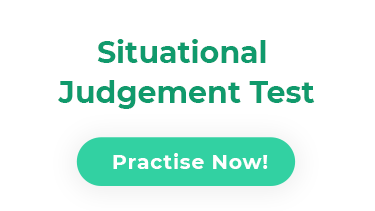Sales Situational Judgment Test Preparation 2025

The sales profession welcomes those who can be enthusiastic about the sales process and its underlying dynamics. Fresh graduates and seasoned job seekers alike find sales to be an attractive career destination. And for good reasons. Career opportunities in sales abound, and the median annual salary for sales representatives alone ranges between £35,000 and £135,000.
Since most sales situations are challenging, sales professionals have to meet many expectations. One of them is the ability to use sound situational judgment when problems or conflicts arise. This professional quality undergoes assessment through a pre-employment screening procedure known as the sales situational judgment test.
Why You Have to Take a Sales SJT
Assessment centres worldwide administer situational judgment tests to evaluate applicants judgment ability – which is so crucial to success in many fields. In sales specifically, SJTs help to assess one’s aptitude for the unique demands of each individual sales position.
Due to their potency, sales SJTs have become an important mainstay in the sales hiring process. Along with traditional hiring practices like an interview, they help to predict whether you are the most capable candidate.
What most sales job seekers don’t realise is that sales SJTs are rather a blessing than an annoying technicality. Unlike job interviews, situational judgment tests are free from biases and allow for the objective assessment of your merits.
How to Take Advantage of a Typical Sales SJT
Sales is a diverse occupational field. Almost all positions within it, however, require that you possess the ability to use sound judgment. Where they differ is how each particular job expects you to apply your situational judgment ability.
Sadly, you can’t predict the content of every sales SJT. What you can prepare for, however, is the psychometrics at the core of almost every exam. Regardless of the job position, most sales SJTs share similar formats when it comes to aptitude questions.
The following types of question formats are used in the vast majority of sales SJTs:
- Scenarios – You will face a hypothetical but likely sales-related situation. You will then have to pick the option that contains your potential response to this situation. Select only those answers that most accurately describe how you would act if you were in this test situation.
- Most-Least Likely / Best-Worst Answer Tables – You will have to acquaint yourself with the description of a hypothetical but likely work-related scenario. After you form your judgment of it, you will have to rate each potential response. You will need to do so through an answer table, filling it out by assessing each response option as something you would be either most or least likely to do. Or, something you would consider as either the best or the worst way to deal with the test situation.
- Ranking and Rating – You will have to deal with a set of statements inquiring about your personality. After reviewing them, you will have to rank or rate them depending on how much they apply to you.
What Competencies Sales SJTs Evaluate
The spectrum of aptitude areas critical to sales that these types of SJT questions assess may vary. Here are some tips on the most common sales competencies that they might evaluate:
- Ability to deal with conflict situations effectively.
- Listening, questioning, negotiation, and closing skills.
- Ability to set goals and achieve them.
- Teamworking skills.
- Personal attributes such as good memory, enthusiasm, initiative and responsibility.
- Desire to develop as a professional.
How to Prepare for Sales SJT Exams
What seems to frustrate most sales SJT exam takers is their lack of familiarity with the test in advance. Luckily, there are ways you can ensure your exam preparation. For instance, you can practice with free online example questions and get a grasp of the exam’s overall format. Or, you can get more in-depth knowledge of this test by analysing sample answers and explanations in exam study guides. Both methods will boost your confidence, and your exam scores will improve as a result.

